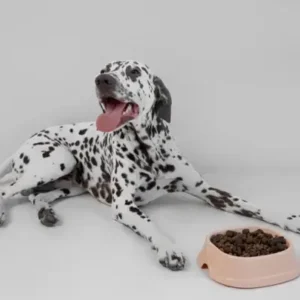Health Benefits of Cucumbers for Dogs
Cucumbers offer several health benefits for dogs. Here’s how they can contribute to your dog’s overall well-being:
- Hydration and Digestive Support: Cucumbers have a high water content, up to 95%, which makes them an excellent way to help keep your dog hydrated. Especially for dogs that aren’t big water drinkers, cucumbers can be a great way to add some moisture to their diet.
- Low in Calories and Good for Losing Weight: Cucumbers are low in calories, making them a perfect snack for dogs on a diet or those prone to weight gain. Cucumbers are an ideal option if you’re looking for a healthy alternative to high-calorie treats.
- Rich in Nutrients: Cucumbers contain vitamins and minerals, including Vitamin K, Vitamin C, and potassium. These nutrients can help with bone health, and immune system, and even support your dog’s overall well-being.
- Fiber Content: Cucumbers also contain fiber, which can help promote healthy digestion. The fiber can assist in keeping your dog’s digestive system running smoothly, helping to prevent constipation and promote regular bowel movements.
How Many Cucumber Slices Can Dogs Eat?
The number of cucumber slices your dog can safely eat depends on their size. What’s suitable for a German Shepherd may not be the right portion for a Yorkie. Even with healthy treats like cucumbers, it’s important to remember that snacks should make up no more than 10% of your dog’s diet. The remaining 90% should come from a balanced, nutritious dog food. Below are general guidelines for the amount of cucumber based on your dog’s weight and breed size.
| Dog Size | Weight Range | Cucumber Slices | Examples of Breeds |
| Extra-small | 2-20 lbs. | 1-2 slices | Maltese, Pekingese, Italian Greyhound |
| Small | 21-30 lbs. | 2-3 slices | French Bulldog, Cocker Spaniel, Miniature Schnauzer |
| Medium | 31-50 lbs. | 5-6 slices | Beagle, Bulldog, Cavalier King Charles Spaniel |
| Large | 51-90 lbs. | Handful of slices | Boxer, Golden Retriever, Rottweiler, Australian Shepherd |
| Extra-large | 91+ lbs. | Large handful of slices | Great Dane, Mastiff, Saint Bernard, Alaskan Malamute |
Potential Risks of Feeding Cucumbers to Dogs
While cucumbers are generally safe for dogs, there are a few things to keep in mind while feeding your dog:
- Choking Hazard Cucumbers can pose a choking risk if not cut into small, manageable pieces. Always slice the cucumber into bite-sized chunks, especially for small dogs. You may also want to remove the seeds if your dog tends to swallow them whole.
- Overconsumption Like any food, cucumbers should be fed in moderation. Overeating cucumbers can lead to upset stomach, gas, or diarrhea, particularly if your dog isn’t used to a high-fiber snack.
- Allergic Reactions While rare, some dogs may have an allergic reaction to cucumbers. If you’re introducing cucumbers, start with a small amount and monitor for any signs of discomfort or allergic reactions like itching, swelling, or gastrointestinal issues.
How to Serve Cucumbers to Your Dog
To serve cucumbers safely to your dog breed, follow these tips:
- Cut the cucumber into small pieces to avoid choking hazards. If your dog is small, you can slice the cucumber even thinner.
- Remove the seeds or skin if your dog is sensitive to them. Some dogs may have trouble digesting cucumber skin, while the seeds can be tough to chew.
- Moderation is key. While cucumbers are a healthy snack, they should only be given in small amounts and as an occasional treat. A few slices are more than enough for your dog.
Healthy Alternatives to Cucumbers for Dogs
If your dog isn’t a fan of cucumbers or you’d like to offer some variety, here are other healthy, dog-friendly fruits to consider:
- Apples: A crunchy and sweet snack, apples are packed with vitamins A and C. Just be sure to remove the seeds and core before serving.
- Bananas: A soft and naturally sweet treat, bananas are rich in potassium and make an excellent occasional snack. Serve in small slices to avoid overfeeding.
- Watermelon: A hydrating and refreshing option, watermelon is full of water and nutrients. Remove the seeds and rind before offering it to your pup.
All of these treats should be served in moderation and complement a balanced diet.








